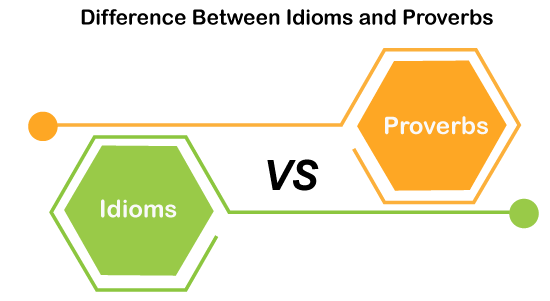Difference between Idioms and ProverbsIdioms and proverbs are often used by us in certain situations. We often tend to give advice to someone through idioms and proverbs. We come across a lot of idioms and proverbs both in Hindi and in English. But many of us do not know the meaning and difference between idioms and proverbs. So, let us begin by understanding the meaning of these two terms. An idiom is defined as a phrase that comprises of its own meaning. But this meaning cannot be understood in a layman's language. Idiom has a non-literal meaning. There are around twenty five thousand idioms in English. On the other hand, a proverb is defined as a short sentence that is usually used to give advice to someone. It is considered as a well-known fact that is prevalent in Indian households. 
Now, let us look at some fundamental differences between idioms and proverbs.
So this is the basic difference between idioms and proverbs. We have seen that proverbs and idioms are often used by our parents and grandparents. Now, let us look at the list of some of the common idioms.
These are the most widely used English idioms. Now, let us look at the commonly used proverbs in English.
So, these are commonly used proverbs that we often hear from everyone. There is a never-ending list of these idioms and proverbs, but the ones mentioned above are the most common idioms and proverbs used in English. Well, it is interesting to note that proverbs were written by King Solomon in 700 B.C. Proverbs and idioms are used to indicate a deep sense of thought or emotion. Proverbs are used to give advice to the people. In work environments, idioms and proverbs are used to motivate the employees and create a positive work environment. There are many kinds of proverbs and idioms, like African proverbs and idioms, Chinese proverbs and idioms, French proverbs and idioms, etc. A proverb is a bit of wisdom provided to people, while an idiom is a phrase that has its own meaning. The meaning that an idiom comprises of cannot be understood by a common man. Both idioms and proverbs have deep and vivid meanings. Both have some basic differences that are already given above. Thus, both idioms and proverbs have different meanings which provide a sense of deep thought and emotion.
Next TopicDifference between
|
 For Videos Join Our Youtube Channel: Join Now
For Videos Join Our Youtube Channel: Join Now
Feedback
- Send your Feedback to [email protected]
Help Others, Please Share










